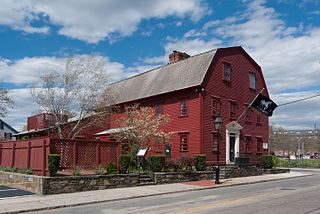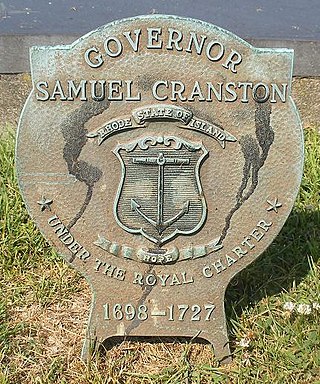William Bradford was a physician, lawyer, and politician, serving as United States Senator from Rhode Island and deputy governor of the state.

Bristol is a town in Bristol County, Rhode Island, United States, as well as the county seat. The population of Bristol was 22,493 at the 2020 census. It is a deep water seaport named after Bristol, England. Major industries include boat building and related marine industries, manufacturing, and tourism. The Bristol Warren Regional School District manages the unified school system for Bristol and the neighboring town of Warren. Prominent communities include Portuguese-Americans, mostly Azoreans, and Italian-Americans.

Triangular trade or triangle trade is trade between three ports or regions. Triangular trade usually evolves when a region has export commodities that are not required in the region from which its major imports come. It has been used to offset trade imbalances between different regions.

John Brown was an American merchant, politician and slave trader from Providence, Rhode Island. Together with his brothers Nicholas, Joseph and Moses, Brown was instrumental in founding Brown University and moving it to their family's former estate in Providence.

Benjamin Bourne was a United States representative from Rhode Island, a United States district judge of the United States District Court for the District of Rhode Island and a United States Circuit Judge of the United States Circuit Court for the First Circuit.

The Gaspee affair was a significant event in the lead-up to the American Revolution. HMS Gaspee was a Royal Navy revenue schooner that enforced the Navigation Acts around Newport, Rhode Island, in 1772. It ran aground in shallow water while chasing the packet boat Hannah on June 9 off of Warwick, Rhode Island. A group of men led by Abraham Whipple and John Brown I attacked, boarded, and burned the Gaspee to the waterline.

The history of Rhode Island is an overview of the Colony of Rhode Island and Providence Plantations and the state of Rhode Island from pre-colonial times to the present.

James DeWolf was an American slave trader and politician. He served as a state legislator for a total of nearly 25 years, and in the 1820s served as a United States senator from Rhode Island. Along with trading in slaves, DeWolf invested in sugar and coffee plantations in Cuba and became the wealthiest man in his state. By the end of his life, he was said to be the second-richest person in the entire United States. During his lifetime, his name was usually written "James D'Wolf".

Russell Warren (1783–1860) was an American architect, best known for his work in the Greek Revival style. He practiced in Bristol and Providence.
Benjamin DeWolf JP was a businessman and political figure in Nova Scotia. He represented Hants County in the Nova Scotia House of Assembly from 1783 to 1798.

Samuel Cranston (1659–1727) was a governor of the Colony of Rhode Island and Providence Plantations during the first quarter of the 18th century. He held office from 1698 to 1727, being elected to office 30 times and served as governor longer than any other individual in the history of both the colony and the state of Rhode Island. The son of former Rhode Island Governor John Cranston, he was born in Newport and lived there his entire life. Going to sea as a young man, he was captured by pirates, and held captive for several years before returning to his family.
Christopher Lippitt was an American Revolutionary War officer and founder one of the earliest textile mills in Rhode Island.
John DeWolf was an American slave-trader, farmer, and justice of the Rhode Island Supreme Court from May 1818 to May 1819, appointed from Bristol, Rhode Island.
Luke Drury was a justice of the Rhode Island Supreme Court from June 1822 to May 1824.
Shearjashub Bourn was an associate justice of the Rhode Island Supreme Court from August 1776 to May 1778, and chief justice from May 1778 until his death in 1781.
Robert Livingston Cutting was an American businessperson based in New York City. At one point president of the New York Stock Exchange, he was a co-founder of the Continental Bank of New York in August 1870.

John Lloyd Aspinwall was an American lawyer and soldier who served in the U.S. Civil War, achieving the rank of brigadier general in the U.S. National Guard.

The DeWolf family is a prominent Canadian and American family that traces its roots to Balthazar DeWolf. The family's lineage can be traced back to Balthazar DeWolf, who was born in 1620 in the Netherlands and later immigrated to North America.

Abraham Redwood was a West Indies merchant, slave trader, plantation owner, and philanthropist from Newport, Rhode Island. He is the namesake of the Redwood Library and Anthenaeum, one of the oldest libraries in the United States. Redwood was the President of the Redwood Library and Anthenaeum from 1747 to 1788.












